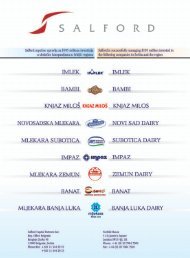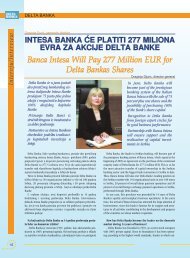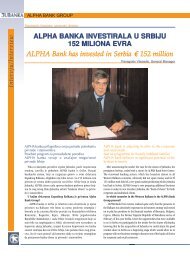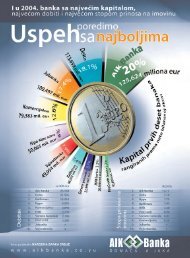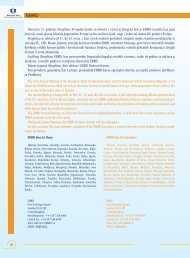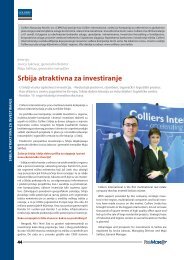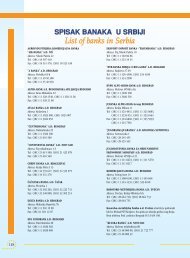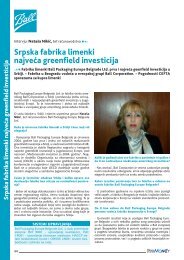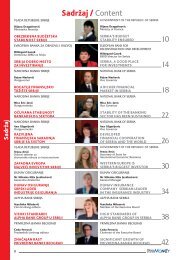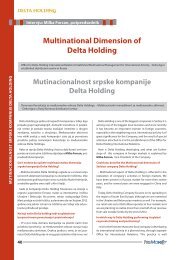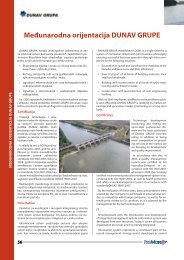You also want an ePaper? Increase the reach of your titles
YUMPU automatically turns print PDFs into web optimized ePapers that Google loves.
Intervju: Radovan Jelašić, guverner<strong>Srbija</strong> <strong>očekuje</strong> <strong>nove</strong> <strong>strane</strong> <strong>banke</strong>- Kapacitet bankarskog tržišta Srbije nije iscrpljen - očekuju se <strong>nove</strong> <strong>banke</strong> - U Srbiji predstoje velikerestrikcije u javnoj potrošnji - Za infrastrukturne radove obezbeđen svež kapital<strong>Srbija</strong> <strong>očekuje</strong> <strong>nove</strong> <strong>strane</strong> <strong>banke</strong>Bankarski sektor Srbije spremno je dočekao udare svetskefinansijske krize, zahvaljujući restriktivnim merama supervizijei monetarne politike Narodne <strong>banke</strong> Srbije koju je vodilanekoliko godina unazad.Njeni građani, međutim, na vesti o krizi reagovali su takošto su tokom oktobra i <strong>nove</strong>mbra podigli iz banaka 17 odstodevizne štednje, ili oko mlijardu evra. To je izazvalo poremećaju deviznom kursu dinara, ali posle prvog udara, monetarnisektor u Srbiji je ušao u mirnije vode. Makroekonomska stabilnostje potvrđena novim aranžmanom sa Međunarodnimmonetarnim fondom, a građani polako vraćaju štednju u<strong>banke</strong>.Novu monetarnu politiku i mere za održavanje makroekonomskestabilnosti i stabilnosti kursa dinara objašnjavaRadovan Jelašić, guverner Narodne <strong>banke</strong> Srbije.Koliko je na bankarski sektor Srbije uticala finansijskakriza u svetu i kakvi su rezultati za prošlu godinu?- Sa stanovišta apsolutne sume profita prošla godina bilaje najprofitabilnija godina za bankarski sektor u Srbiji, ali toslavlje pokvarila je kriza, kako u Srbiji, tako i u inostranstvu.Danas se mnogo više priča o reorganizacij, restruktuiranju,smanjenju broja zaposlenih u bankama i većim rezervacijamakapitala, nego pre samo nekoliko meseci.Zbog restriktivne politike NBS, kako sa stanovišta solventnosti,tako i likvidnosti, bankarski sektor u Srbiji bio je dobropripremljen za predstojeće izazove, ali treba biti svestan dasmo sa druge <strong>strane</strong> mnogo ranjiviji.<strong>Srbija</strong> nije članica Evropske unije, a to znači da ne možeda računa na podršku Brisela, poput drugih zemalja.Mi smoubeđeni da bankarski sektor, koji je u okrobru i <strong>nove</strong>mbruprošle godine već dokazao svoju otpornost na izazove, možeuspešno da se suoči i sa eventualnim novim izazovima.Ali iz dosadašnje krize treba izvući pouke, a one govore dau Srbiji treba da bude više kredita u dinarskom znaku, a ne udeviznom, da se <strong>banke</strong> više orijentišu na dinarske depozite,umesto na devizne, da se više finasiraju iz lokalnih depozita, ane zaduživanjem u inostranstvu i da je banakama i u budućnostipotrebno da drže visok nivo likvidnosti i solventnosti.Sada se dokazalo da poverenje stanovništva u bankarskisektor još mora da se učvrsti.Da li je <strong>Srbija</strong> obezbedila novac za održavanjemakroekonomske stabilnosti?- <strong>Srbija</strong> je među prvim zemljama iz predostrožnosti najprenapravila jedan program sa Međunarodnim monetarnimfondom, a posle toga u jednom kratkom vremenskomperiodu i jedan klasičan „stend baj” aranžman koji predviđaThe banking sector of Serbia has been well prepared forthe waves of the financial crisis, owing to the restrictive measuresof supervision and monetary policy, which the NationalBank of Serbia has pursued in the past several years.At the news of the crisis, however, our citizens have withdrawnfrom the banks 17 percent of foreign currency savings,i.e. around one billion euros. This has caused fluctuations inthe dinar exchange rate. However, after the first wave, themonetary sector in Serbia entered a more stable period. Themacroeconomic stability was ensured by the new Arrangementwith the International Monetary Fund, and with this aboost in confidence has led to the citizens putting moneyback into the banks.Mr. Radovan Jelašić, the Governor of the National Bank ofSerbia, explains the new monetary policy and the measuresfor maintaining the macroeconomic and dinar exchangerate stability.How much has the world financial crisis affected thebanking sector in Serbia, and what were the operatingresults of the banks for the last year?- As regards to the absolute profit sum, last year was themost profitable year for the banking sector in Serbia, but thisachievement was spoiled by the crisis that affected both Serbiaand other countries. We talk much more today than a fewmonths ago about the reorganization, restructuring and reductionof the number of employees in the banks and highercapital reservations.Due to the NBS’s restrictive policies, both in respect to solvencyand liquidity, the banking sector in Serbia was wellprepared for the forthcoming challenges.However, we should be aware that, on the other hand, weare much more vulnerable.Serbia is not a member of the EU, which means that we cannotcount on support from Brussels, like other countries. Weare sure that the banking sector, which already proved to beprepared to deal with the challenges in October and Novemberlast year, will be able to successfully face potential newchallenges.We should learn lessons from the situation caused bythe world financial crisis, which tell us that, in Serbia, loansshould be granted in dinars rather than in foreign currencies,that the banks should focus more on dinar deposits, thanforeign currency deposits, that they should be financed fromthe local deposits rather than from external borrowings, andthat the banks should maintain a high level of liquidity andsolvency in the future, since it appears that the confidence ofcitizens in the banking sector needs to be reinforced.
Interview: Radovan Jelašić, GovernorSerbia is expecting new foreign banks- The banking market potential has not been exhausted - new banks are expected. - Serbia will face greatrestrictions in public consumption. - Fresh capital has been provided for infrastructure works.Advantages of Serbia for investments- Serbia is the only country in the region that has signedan Agreement with the International Monetary Fund,its banking sector is stable, and the authorities havea proven track record on the adjustments needed forthis new economic reality. The post election politicalcycle has ensured the period for the implementation ofchanges. These advantages very specific to Serbia makeit a favourable option to businesspeople and investorsas a key country in the Western Balkan Region, both in apolitical and economic sense - says the Governor Jelašić.povlačenje oko 500 odsto srpske kvote, ili oko tri milijarde evra.Uslov je smanjenje, odnosno prilagođavanje javne potrošnjeza 12 odsto, što ujedno znači i povećanje budžetskogdeficita sa 1,75 na 3 odsto bruto društvenog proizvoda. Topredstavlja rekordno prilagođavanje za Srbiju i uopšte neide jednostavno. Naravno, propraćeno je, kako određenimpolitičkim, tako i socijalnim tenzijama, ali alternative nemapošto se postojeći model ekonomske politike ne može višenastaviti.Program sa MMF-om međutim ne znači samo da <strong>Srbija</strong> imajednog dodatnog saveznika u održavanju makroekonomskestabilnosti, već znači i da je ta institucija spremna svoje poverenjeu tu kreiranu mekroekonomsku politiku da dokažejednim kreditom od blizu tri milijarde evra.Na koji period je predviđena podrška MMF-a?- Ovim aranžmanima obezbedili smo makroekonomskustabilnost za dve godine. Program sa MMF-om važi do aprila2011. godine, ali će njihova podrška biti realizovana u najvećojmeri tokom ove godine iznosom od oko 2,1 milijardeevra. Restrikcije u javnoj potrošnji, zamrzavanje plata, penzijai drugo dogovara se zaključno sa 2010. Na tom putu kazavršetku programa određene su stanice, tako da je prva revizijapredviđena do sredine avgusta ove godine. Tada će sevideti da li su potrebne <strong>nove</strong> restriktivne mere za smanjenjejavne potrošnje ili nisu.Kakav je stav evropskih banaka koje imaju svoje <strong>banke</strong>u Srbiji?- Sastanak sa evropskim poslovnim bankama koji je organizovanod <strong>strane</strong> MMF-a i Evropske <strong>banke</strong> za obnovu i razvojdoneo je jednu drugu pozitivnu vest, a to je da tokom 2009. i2010. godine one neće smanjiti nivo izloženosti prema Srbiji.Na osnovu naših informacija, sve <strong>banke</strong> koje su tu planirajuda u najmanju ruku zadrže nivo svoje aktivnosti. Pojedine<strong>banke</strong> planiraju da povećaju svoj angažman.Has Serbia provided the money for maintainingmacroeconomic stability?- Serbia was one of the first countries that was approved aPrecautionary Program by the International Monetary Fund,and shortly after that, it also reached a standard Stand-ByArrangement with the IMF. This Arrangement provides forwithdrawal of about 500 percent of the Serbian quota, orabout three billion euros. The precondition is the lowering,i.e. adjusting, of public consumption by 12 percent, whichin the same time implies increasing of the budget deficitfrom 1.75 to 3 percent of the gross domestic product. Thisconstitutes a record adjustment for Serbia, and it is not at allsimple. Of course, it has been accompanied by certain politicaland social tensions, but there is no alternative, since thecurrent economic policy model cannot be maintained anylonger. The IMF Program, however, does not only mean thatSerbia has an additional ally in maintaining its macroeconomicstability, but also that this institution is ready to proveits confidence in the macroeconomic policy created in sucha way, with a loan of around three billion euros.
<strong>Srbija</strong> <strong>očekuje</strong> <strong>nove</strong> <strong>strane</strong> <strong>banke</strong>Da li će u Srbiju doći <strong>nove</strong> <strong>strane</strong> <strong>banke</strong> i da li će državaprodavati svoj udeo u nekim bankama?- Narodna banka Srbije otvorena je nadalje za izdavanjelicenci za kredibilne finansijske institucije. Tržišnog kapacitetaima dovoljno, pre svega za onog koji želi da preuzmeneku instituciju, ali ako neko proceni da mu je lakše dapokrene posao sa greenfield investicijom, otovreni smo i zatu mogućnost.U Srbiji država planira da konsoliduje svoj vlasnički udeo upreostalom delu bankarskog sektora i da, zavisno od uslovana tržištu, taj njen deo pređe u privatno vlasništvo. Očekujese da udeli države u nekim bankama budu privatizovani.Koliko su matične <strong>banke</strong> iz inostranstva povukle devizaod svojih „ćerki“ iz Srbije u poslednjim mesecima i da lije to bio uzrok za poremećaj kursa dinara?- Glavni razlog poremećaja kursa dinara nije bila tražnjadeviza iz inostranstva, nego drastično smanjena ponudazbog efekata krize na finansijskim tržištima. Upravo zbogtoga, glavni izvor finansiranja tekućeg platnog deficita bilesu rezerve NBS, što se konkretno vidi i po ciframa. Jedino sedesilo da je tokom oktobra i <strong>nove</strong>mbra bilo značajnog povlačenjasredstava iz inostranstva u Srbiju od <strong>strane</strong> banaka,kako bi se amortizovao pritisak povlačenja depozita našihgrađana. Posle toga, u decembru, <strong>banke</strong> su se razduživaleprema inostranstvu. U međuvremenu, ušli smo u mirnijevode i tokom 2009. Ponovo imamo blago povećanje <strong>nove</strong>štednje, delimično se vraća ono što je podignuto iako će bitipotrebno mnogo više vremena da se to u potpunosti vrati. Izbanaka je podignuta oko milijardu evra devizne štednje, štoje 17 odsto ukupne štednje.Koliko je devalvirao dinar od oktobra prošle godine?- Za poslednjih pet godina, dinar ima mnogo stabilniji kursnego što je bio kurs dolara prema evru ili kurs nekih drugihvaluta. Ali u Srbiji, sve što nije fiksno smatra se nestabilnim,i nezavisno od toga koliko je dinar stabilan, kada se gledajucifre, percepcija ljudi je i nadalje takva da je mnogo lepše živetiu nerealnom svetu nižih kamatnih stopa koje se nude ustranim valutama, nego razmišljati i raditi u dinarima.Da li ima stranih investicija u Srbiju?- Stranih investicija će ove godine biti manje, ali njihov nivotrebalo bi da pređe milijardu evra i da bude između milijardu,milijardu i po evra. Od toga je jedan deo već ostvaren preuzimanjemvećinskog udela NIS-a od <strong>strane</strong> ruskog Gazpromaza 400 miliona evra. Strane investicije su nam takođe jakovažne za pokriće tekućeg platnog deficita, ali će on ove godinebiti mnogo manji. Njegov pad će biti posledica značajnogsmanjenja domaće tražnje, a uzrok za to biće dogovorenozamrzavanje zarada, penzija, smanjenje celokupne javne potrošnje.Tražnja uvozne robe samim tim biće mnogo manja,što će opet smanjiti tekući platni deficit.Zašto bi strani investitori trebalo da dođu baš sadau Srbiju, da ulože novac, da grade fabrike i drugeobjekte?- Mislim da se od početka procesa tranzicije u Srbiji nijemoglo nešto kupiti jeftinije nego sada, zbog značajnogsmanjenja cena na berzi i zbog manje tražnje. Država takođenastavlja privatizaciju. Kada su u pitanju velika javna preduzeća,privatizovan je samo NIS, a privatizacija Telekoma, Elek-10For what period will the IMF support be extended?- With this arrangement, we have ensured the macroeconomicstability for two years. The IMF Program will be effectiveuntil April 2011, but the support will be mainly extendedthis year, in the amount of 2.1 billion euros.The restrictions in public consumption, freezing of salaries,pensions and other, have been foreseen until the end of2010. In the course of the Program’s implementation, certainreviews have been foreseen, with the first one scheduled forthe middle of August this year. We will then see if any newmeasures for lowering public consumption will be neededor not.What is the view of the European banks that have theirbanks in Serbia?- The meeting with the European business banks, which arethe founders of the banks in Serbia, held on 27 March 2009,in Vienna, in the organization of the IMF and the EuropeanBank for Reconstruction and Development, resulted in thepositive news that they would not lower their level of exposuretowards Serbia in 2009 and 2010. We are confident thatall banks will sign up to the financial sector support program.According to our information, all the banks operating in Serbiaplan to maintain at least the current level of business activities.Some banks plan to increase their involvement.Will any new foreign banks come to Serbia, and will theGovernment sell its stake in some of the banks?- The National Bank of Serbia is open for issuing licensesto credible financial institutions. There is enough market potential,primarily for the takeover of institutions, but if somebodyestimates that it would be easier to start business witha Greenfield investment, we are open to that possibility aswell. The Serbian Government plans to consolidate its stakein the remaining part of the banking sector and, dependingon the market conditions, privatize its stake. It is expectedthat the Government’s stakes in some banks will be privatized.How much foreign currency have the parent banksfrom abroad withdrawn from their daughter banks inSerbia in the last months, and was that the reason forfluctuations in the dinar exchange rate?- The main reason for the fluctuations in the dinar exchangerate was not the demand for foreign currency from abroad,but the drastically lowered supply, because of the impactof the crisis on the financial markets. In addition, preciselybecause of that, the main source of financing the currentaccount deficit was the NBS reserves, which is shown in thefigures.The only thing worth mentioning were the effects ofthe ‘first news’ of the crisis in October and November, whenbanks in Serbia drew substantial funds from abroad, in orderto mitigate the pressure caused by the withdrawal of ourcitizens’ deposits from these banks. After that, in December,the banks repaid their foreign debts. In the meantime, weentered a calmer period, and in 2009, new citizens’ savingsslightly grew, and the withdrawn money was partly returnedto the banks, though it will take some time until the entireamount is once again returned to the banks. The total ofabout one billion euros of the foreign currency savings waswithdrawn from the banks, which is 17 percent of the totalsavings.
Prednosti Srbije za investiranje- <strong>Srbija</strong> jedina u regionu ima zaključen aranžman saMeđunarodnim monetarnim fondom, bankarski sektorje stabilan, a vlasti su svesne šta treba da se uradi naprilagođavanju novoj ekonomskoj realnosti.Postizborni politički ciklus obezbeđuje vremenski period ukojem te promene mogu da se sprovedu.Upravo te prednosti Srbiju preporučuju privrednicimai investitorima kao ključnu zemlju u regionu zapadnogBalkana u političkom i ekonomskom smislu - kaže guvernerJelašić.troprivrede Srbije i mnogih drugih energetskih sistema tekpredstoji. U međuvremenu, restruktuiranje tih preduzećabiće deo programa sa MMF-om.Kako vidite Srbiju u regionu?- Evropska budućnost Srbije je garantovana na srednji ilidugi rok, ali je trenutno mnogo više u funkciji nekih političkihdešavanja, nego sprovođenja ekonomskih reformi. Investicije,pre svega u sferi infrastrukture, energetike, industrijeautomobila i mašinogradnje bile su tradicionalno nešto gdeje <strong>Srbija</strong> imala određene prednosti. Za osam godina tranzicijeu Srbiji nikada nije bio problem to da se ne zna šta trebada se radi, ili da nemamo plan kako izaći i kako ubrzati procestranzicije. Tradicionalno, problem je do sada bio „tajming” ito pre svega zbog složene političke situacije. Međutim, upravou ovom vremenu, ubeđen sam da će <strong>Srbija</strong> dokazati damože i brže i efikasnije da sprovodi sve te reforme, poštosada nema šta da se gubi, a svaki dan je više nego skup.Da li će doći ove godine do povećanog investiranja uinfrastrukturne projekte?- Već duže vreme, za Srbiju je karakteristično da investicije uinfrastrukturu, pre svega one koje se sprovode preko budžeta,odnosno uz podršku međunarodnih finansijkih institucija,više ne zavise od novca, nego isključivo od kapaciteta državneadministracije, kako sa stanovišta zakonodavne aktivnosti,tako i sa stanovišta raspisivanja konkursa, sprovođenjaprocedure, nominacije pobednika itd. Srbiju u inostranstvučeka blizu milijardu evra već odobrenih kredita. To su kreditikoji su usaglašeni, potpisani, ratifikovani od <strong>strane</strong> skupštine,ali se ne povlače, jer se ne ispunjavaju uslovi na koje smo mipristali, bez obzira na to što čak plaćamo određeni trošak zanepovlačenja tih sredstava. Ti krediti treba hitno da se povukui da na osnovu tih javnih radova u sistem uđe svež kapital.Dobar je primer beogradska Gazela, za koju novac stoji većgodinu dana, ali pre nego što krenu radovi treba da se ukloniromsko naselje ispod mosta što je jako nepopularno.www.nbs.rsHow much has the dinar devalued since last October?- In the last five years, the dinar exchange rate has beenmuch more stable than the USD to EUR exchange rate, orsome other currencies. Irrespective of how stable the dinaris when you analyze figures, the perception of people is stillthat it is much better to live in an unrealistic world of lowinterest rates, offered in foreign currencies, than to think andwork in dinars.Are there any foreign investments to Serbia?- There will be less foreign investments this year, but theirlevel should exceed a billion euros, and should stand atabout a billion to a billion and a half euros. A part of this sumhas already been realized, by the takeover of a majority stakein NIS by the Russian partner Gazprom, in the amount of 400million euros.Foreign investments are even more important for us today,as cover for our current account deficit, the deficit will bemuch lower this year. Its narrowing will be the consequenceof much lower domestic demand, and this will result fromthe agreed freezing of salaries and pensions, and cutting ofoverall public consumption. At the same time, demand forimported goods will be much lower, and that will in turn narrowthe current account deficit.Why should foreign investors come to Serbia rightnow, to invest their money, build factories or otherbuildings?- I think that since the beginning of the transition, you havenot been able to buy anything cheaper than now, because ofa sharp drop in prices on the stock exchange and the lowerdemand. Privatization of the public companies has continued.Only NIS has been privatized and big public companiessuch as Telecom, EPS and many other energy systems are yetto be privatized. In the meantime, the restructuring of thesecompanies will be part of the arrangement with the IMF.How do you see the position of Serbia in the Region?- The European future of Serbia is guaranteed in the mediumor long term, but it is currently much more in the functionof some political issues than of the implementation ofeconomic reforms. Investments, primarily into infrastructure,energy, the automotive industry and machine building,are the area where Serbia has traditionally had certain advantages.In Serbia, during the eight years of transition, wehave never had the problem of not knowing what to do, ornot having a plan how to carry out or speed up the processof transition.Will investments in the infrastructure projects grow thisyear?- For a longer period, it has been characteristic for Serbiathat the investments into infrastructure, primarily thosemade through the budget, with the support of the internationalfinancial institutions, do not depend on money anylonger, but exclusively on the capacity of the public authoritiesin respect of legislative activities, inviting tenders, implementationof the procedure, nomination of winners, etc.Almost a billion euros worth of loans are waiting for Serbiaabroad for investment works. These are the loans that havebeen adjusted, signed and ratified by the Assembly.11Serbia is expecting new foreign banks



